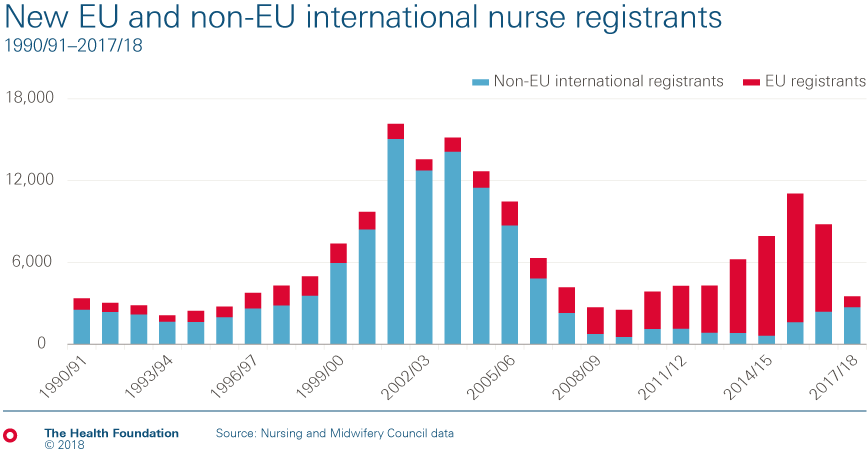Key points
- The number of nurses registering from overseas has fallen substantially from last year from 8,800 to 3,500.
- This has been driven by a fall in the number of EU nurse registrants which has dropped by 87% from 6,400 in 2016/17 to 800 in 2017/18. The Republic of Ireland is now the main source of new nurses recruited from within the EU, while numbers registering from the main EU sources in previous years have dropped ten-fold since 2016.
- This comes as polling shows that most UK adults (71%) think the UK should continue to try to attract nurses from the European Union after the UK leaves the EU.
The latest figures from the Nursing and Midwifery Council (NMC) have shown that the number of new nurses coming from the EU to work in the UK has dropped by 87% from 6,382 in 2016/17 to 805 in 2017/18.
New analysis of the NMC data by the Health Foundation also shows that month on month, registration of new nurses from the EU has flatlined following the Brexit referendum result in June 2016 until April this year. The monthly average number of EU nurses registering in the UK in the first seven months of 2016 was 940 – since January 2017 this monthly average has always been below 100.
The analysis also reveals that the Republic of Ireland is now the main source of new nurses recruited from within the EU, while numbers registering from the main EU sources in previous years – such as Portugal, Spain, Romania and Italy – have dropped ten-fold since 2016.
Meanwhile, the data shows that the inflow of nurses from non-EU countries has not increased enough to compensate for the drop. The total number of new nurse registrants (including from the UK and abroad) in 2017/18 was 3,500 less than a year earlier in 2016/17 – a fall of more than 10%.
The latest NHS workforce statistics reinforce the overall picture of stagnation with nurse vacancies at 10% – around 35,000 more nurses needed – and numbers rising by only 0.12% between March 2016 and 2018.
International recruitment of nurses has long played a role in helping the NHS meet its recruitment needs, with nurses from abroad usually accounting for at least one in every ten new nurses entering the UK register annually. In most years, this figure has been much higher, with up to one in every two of all new nurses coming from abroad. The fall in international registrants therefore raises serious concerns about how the NHS will be sufficiently staffed, given there has not been a compensatory rise in numbers trained in UK.
Most UK adults (71%) think the UK should continue to try to attract nurses from the European Union after the UK leaves the EU, even including almost two thirds (65%) of those who voted 'leave' in the EU referendum.
Polling conducted by Ipsos MORI for the Health Foundation shows that concerns around the sustainability of NHS staffing are shared by the public. The majority of people (79%) don’t think the NHS has enough staff to provide current services.
Only 14% think the UK should reduce the number of non-UK nurses working in the UK, whatever country they come from. And a further 10% believe we should reduce the number of EU nurses working in the UK, replacing them with nurses from non-EU countries.
Further reading
Work with us
We look for talented and passionate individuals as everyone at the Health Foundation has an important role to play.
View current vacanciesThe Q community
Q is an initiative connecting people with improvement expertise across the UK.
Find out more



